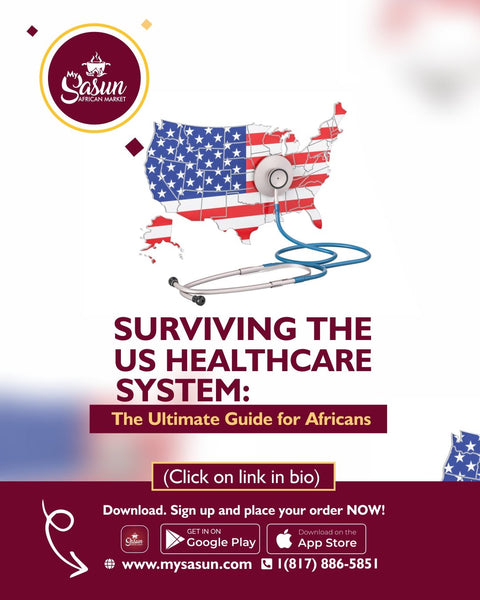The US healthcare system is known for its complexity, high costs, and unique challenges. Navigating this system can be particularly daunting for Africans who are unfamiliar with its intricacies. However, with the right knowledge and preparation, it is possible to successfully navigate the US healthcare system and receive the care you need. In this blog post, we will discuss five essential tips to help Africans survive the US healthcare system.
1. Understand Your Health Insurance Options:
One of the first steps to surviving the US healthcare system is understanding the different health insurance options available to you. Whether you are an immigrant, a student, or a worker, there are various options to consider, such as employer-sponsored plans, government programs like Medicaid or the Children's Health Insurance Program (CHIP), or individual plans through the Health Insurance Marketplace.
2. Establish a Relationship with a Primary Care Physician (PCP)
Having a primary care physician is essential for managing your healthcare in the US. A PCP will serve as your main point of contact for non-emergency medical needs. They can provide preventive care, routine check-ups, and coordinate specialized care if necessary.
Take the time to research and find a PCP who understands your cultural background and has experience working with African patients. Building a good relationship with your PCP is important for effective communication, trust, and better
health outcomes. Regular visits to your PCP can help detect potential health issues early on and prevent them from becoming more serious.
3. Seek Culturally Competent Care
Cultural competence is crucial in healthcare, as it ensures that your unique cultural, social, and linguistic needs are met. When seeking healthcare services, look for providers who are culturally competent and sensitive to your background. They should understand your values, beliefs, and traditions, which can significantly impact your healthcare decisions.
Consider reaching out to African community organizations or local cultural centers that can provide recommendations for culturally competent healthcare providers.
Additionally, don't hesitate to communicate your cultural needs and preferences to your healthcare providers, such as language requirements or religious considerations. By seeking culturally competent care, you can ensure that your healthcare experience is respectful, inclusive, and effective.
4. Advocate for Yourself
In the US healthcare system, it is important to be an active participant in your own healthcare. This means advocating for yourself and actively participating in medical decisions.
Ask questions, seek clarification, and ensure that you understand your diagnosis, treatment options, and potential risks and benefits.
If you face language barriers, consider having a trusted friend or family member accompany you to appointments to help with translation and ensure effective communication.
Remember that you have the right to request a second opinion if you are unsure about a diagnosis or treatment plan. Being proactive and assertive about your healthcare needs can lead to better outcomes and a more satisfying healthcare experience.
5. Utilize Preventive Care and Community Resources
Preventive care plays a vital role in maintaining good health and preventing serious illnesses. Take advantage of preventive services such as vaccinations, cancer screenings, and regular check-ups. Many preventive services are covered by health insurance without cost-sharing, so be sure to check your policy for details.
Furthermore, explore community resources that can help you access affordable healthcare. Non-profit organizations, community health centers, and free or low-cost clinics may offer services tailored to individuals with limited financial resources or without insurance coverage. These resources can provide essential care, medications, and additional support for your healthcare needs.
By following these five essential tips, you can navigate the US healthcare system more effectively and ensure that you receive the care you need. Remember to stay informed about your health insurance options, establish a relationship with a primary care physician, seek culturally competent care, advocate for yourself, and utilize preventive care and community resources.
Additionally, it's important to stay proactive in managing your health by adopting a healthy lifestyle. Eat a balanced diet, engage in regular physical activity, get enough rest, and manage stress effectively. Taking care of your overall well-being can contribute to better health outcomes and reduce the need for extensive medical intervention.
Lastly, don't hesitate to reach out for support when needed. Seek guidance from African community organizations, social services, or healthcare advocacy groups that can provide assistance and resources specific to your needs.
Surviving the US healthcare system may seem daunting, but with the right knowledge and proactive approach, you can navigate it successfully.
Remember, your health is a priority, and by taking these steps, you are empowering yourself to make informed decisions and receive quality care.










Comments (11)
Powerful Herbal treatment is 100% guarantee for HSV cure, the reason why most people are finding it difficult to cure HSV 1 or 2 is because they believe on medical report, drugs and medical treatments which is not helpful to cure HSV and hasn’t proved any sign of helping. Natural roots/herbs are the best remedy which can easily eradicate herpes forever. I never believed it until I was helped and cured of my 16 months genital herpes with natural herbal medicines from Dr Sikies. Where other medical prescribed drugs and treatments failed, Dr Sikies natural herbs helped saved me from Genital herpes permanently and I’m so grateful for this. You can also get help from this great and powerful Herbalist Dr Sikies by reaching himon Email: drsikies@gmail.com / WhatsApp +2348163430143 website to make order now : https://drsikesherbalcuremedicine.weebly.com/
If you have been taking conventional medicines for that Herpes infection and you are still having those re-occurring outbreaks, why don’t you try Herbal Medicines and see it get cured in weeks. For more information, send me an
Email: ridvid8@gmail.com
Telegram: @wafri01
websitehttps:
https://ridvid8.wixsite.com/dr-ayo-herbs-home/about-5
Loan offer
Loan offer Do you need a loan urgently? Do we offer personal loans? Business loans? Mortgage? Agricultural loans? Education loans? Debt Consolidation Loan? Truck loans? Car loans? Hotel loans? Refinance loans? and even more debt? Startup loans? .Offer with 1% interest! Contact: challotloan@gmail.com
Welcome to Good Life Bitcoin Trading
I am a bitcoin professional trader, and I always win my trade with my best
trading platform, so are you looking for a professional trader or looking for
someone that can help you invest and trade your Bitcoin for more profit to be
made? With and 8 hours of investment profit plans.
Do you know you can grow your money by investing in Bitcoin and get profit by
helping you to trade, Email us for more info melodygoodlife617@gmail.com
My investment plans;
Invest $250 X 8=$2,000
Invest $500 X 8=$4,000
Invest $1,000 X 8=$8,000
Invest $1,500 X 8=$12,000
Invest $,2,000 X 8=$16,000
Invest $3,000 X 8=$24,000
Contact us today let’s teach you how you can get that done with proof on my
trading platform by investing and make your profit in 8-Hours..
E-mail Address: melodygoodlife617@gmail.com
Melody Good Life.
A Try We Convince You With Good Life Investment.
Got rid of herpes 1&2 completely, I started the treatment August 2022 for 14 days till now 2025 I have not had a single outbreak, All thanks to Dr. chalopa. It’s fascinating how they say it can’t be cured but here I am how Ironic. “For others like me out there”, there is a chance. He also treat other illnesses like HPV, HIV, PENIS ENLARGEMENT, DIABETES, and More. Email drchalopa@gmail. com
I’m going to share this for awareness purpose. Living with Herpes simplex was depression for me even with my doctor’s advice and medication. My name is Vicky Moore I live in Chicago, Illinois and this is my story. I browsed the Internet in search of remedies or something but unfortunately nothing new, all still had the same results. Sadly I almost quit on myself, it was around 7:30 in the morning when my therapist called me over to her house, at first I was skeptical, but I went anyways on getting there she was smiling and said there’s living proof now, she showed me a lady who also suffered from herpes simplex 3years back and now she is cured by a doctor who also studied natural herbs. I was amazed and lost for words I even doubted but showed me a doctor’s report test. So I contacted the doctor and weeks later, I was cured. So I would love to use this medium to say a big thank you to my therapist and Dr. Chalopa. This story is shared to others like me out there. However, he also treats other illnesses.
Email (drchalopa@ gmail. com)
Got rid of herpes 1&2 completely, I started the treatment August 2022 for 14 days till now 2025 I have not had a single outbreak, All thanks to Dr. chalopa. Whats app +144 8200 8706 --E mail. (drchalopa @ gmail. com)
I recommend exploring World Rehabilitate Clinic for effective nutritional supplements to combat disease. Their formula helped me overcome HSV-1&2.
Am here to let the whole world know that I was diagnose of herpes 3 years ago where all hope was lost and I had nothing to do about it,I just accepted the faith that one day I will cure of this disease and I just pray everyday for a helper and one day my sister introduce me to a herbal doctor man called Dr ahonsie that she saw him on internet well I contact him on his email,I was not fully convinced until he sent me the herbal medicine which he ask me to take for two weeks I took it with faith and i went for a retest in different hospitals and today am cured of this disease and am also using this medium to let all those having STD,like herpes and the rest not to give up,their is a man who can cure you,his name is Dr ahonsie . contact the great herbalist via his Email: drahonsie00@gmail.com / WhatsApp: +2348039482367. https://drahonsie002.wixsite.com/dr-ahonsie
Hello everyone, i have a very important information about herpes virus, i was a victim of hsv1&2 until i met doctor Ahonsie, it still feels like a dream to me. it has been two years now, i have not experience any breakout of herpes. I new about him through a post made on social media, a lady shares her experience and then i decided to contact him and ever since i contacted i was encourage and with no doubt i was cured from herpes simplex in just two weeks. He also treat other illnesses like HPV, HIV, CANCER, THYRIOD, PENIS ENLARGEMENT, and more contact him via Email: drahonsie00@gmail.com / WhatsApp: +2348039482367. https://drahonsie002.wixsite.com/dr-ahonsie https://www.facebook.com/drstellaherbalhome?mibextid=ZbWKwLThanks